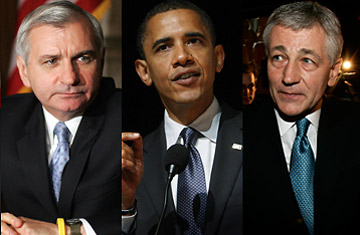
Jack Reed; Barack Obama; Chuck Hagel
When Barack Obama was preparing to make his first trip to Iraq as part of a congressional delegation in January, 2006, he sought the advice of one of his Senate colleagues about how to make the most of his day and a half there, most of which would be within the 10-mile-wide, U.S.-controlled Green Zone. Seek out some journalists, Senator Jack Reed told him, and ask them to give you an off-the-record assessment of what life there is really like. As Obama later wrote in his book The Audacity of Hope, that session turned out to be a valuable reality check, a reminder of "just how quixotic our efforts in Iraq still seemed — how, with all the American blood, treasure and the best of intentions, the house we were building might be resting on quicksand."
Few know better than Jack Reed how to get beyond the customary Green Zone briefings that visiting VIPs typically get in Iraq. The Rhode Island Senator, a West Point grad and former Army Ranger who now is one of the senior Democrats on the Senate Armed Services Committee, has been to Iraq 11 times, typically traveling without an entourage into battle zones, where he can talk more frankly to the grunts and mid-level officers. None other than presumptive G.O.P. nominee John McCain told the Providence Journal in 2005: "Jack travels to Iraq, he has friends in Iraq, and because of his many connections, Jack sees things in Iraq that a lot of us don't get to see."
So it was no surprise that Obama reached out to Reed again last month, as he was beginning to plan a return trip to Iraq — this time as the presumptive Democratic nominee, running on a promise to get the troops out. Reed and another Army veteran — Republican Chuck Hagel of Nebraska, who received two Purple Hearts in Vietnam — will accompany Obama, not only to Iraq, but also to Afghanistan, where Obama has pledged to intensify the miliary effort.
While the details of their trip have been kept secret (indeed, the Obama campaign has refused to even publicly confirm that he is going), Obama's choice of traveling companions is telling. Both Hagel and Reed have been vocal advocates for troop withdrawal, though they split over the initial vote to authorize President Bush to use military force to oust Saddam Hussein, with Reed opposing the invasion and Hagel supporting it. Both carry enormous influence on military issues on Capitol Hill and have strong ties to the Pentagon. Obama's invitation of Hagel is also meant to send a signal that he is serious about trying to build a bipartisan consensus on foreign policy.
Obama aides also say there is good chemistry in this group. Hagel and Obama serve together on the Senate Foreign Relations Committee, have worked in tandem on nonproliferation issues and once even came across each other by happenstance traveling on congressional business in Russia. Reed and Obama have not only consulted on Iraq, but collaborated on legislation involving West Africa — a significant number of Reed's Rhode Island constituents have roots in Liberia — and enhancing middle school education in this country.
The trip comes at a time when Obama's Iraq stance is being criticized from both ends of the political spectrum. Republicans say the fact-finding trip is merely for show, given Obama's commitment to troop withdrawal, which he repeated in a speech July 15. McCain noted that Obama gave the speech about his plans for Iraq and Afghanistan "before he has even left, before he has talked to General Petraeus, before he has seen the progress in Iraq, and before he has set foot in Afghanistan for the first time. In my experience, fact-finding missions usually work best the other way around: first you assess the facts on the ground, then you present a new strategy." Obama's liberal supporters, on the other hand, have been unsettled by his recent comments suggesting that, as President, he might "refine" his timetable for bringing American forces out of Iraq based on the recommendations he gets from American commanders.
But this, Reed has promised, will not be the typical, carefully stage-managed view that visiting dignitaries usually get in Iraq and Afghanistan; nor will it merely echo the kind of briefings that lawmakers can get back in Washington from top Pentagon officials and commanders. The goal, he told MSNBC, is "to get down to the brigade combat teams. It's to get out and talk to troops. It's to get out and talk to the advisers, the embedded special forces and SEALs. That's what's critical, I think, and it's what we hope to accomplish on the trip. It provides some more context, a better sense of what's going on."
Not surprisingly, Obama's choice of traveling companions has fueled speculation that Reed might also be in the running to become Obama's vice presidential pick. The Rhode Island Senator has said he is not interested in being considered. Then again, if things go well, he might be persuaded to change his mind. After all, there's no better bonding experience than a road trip.
